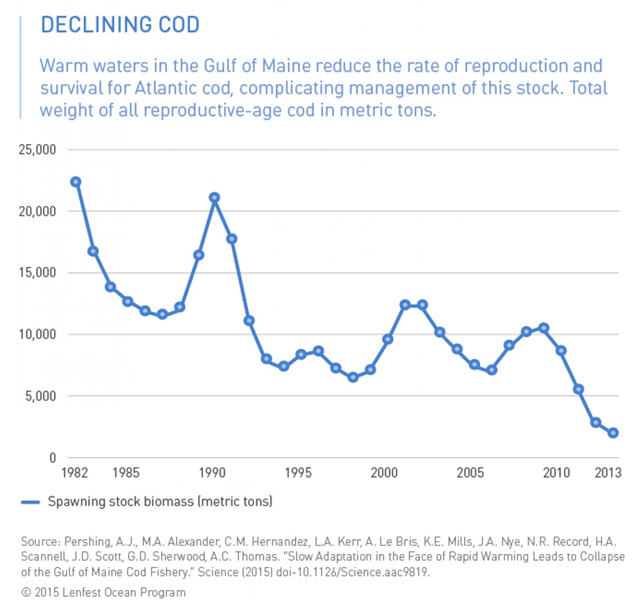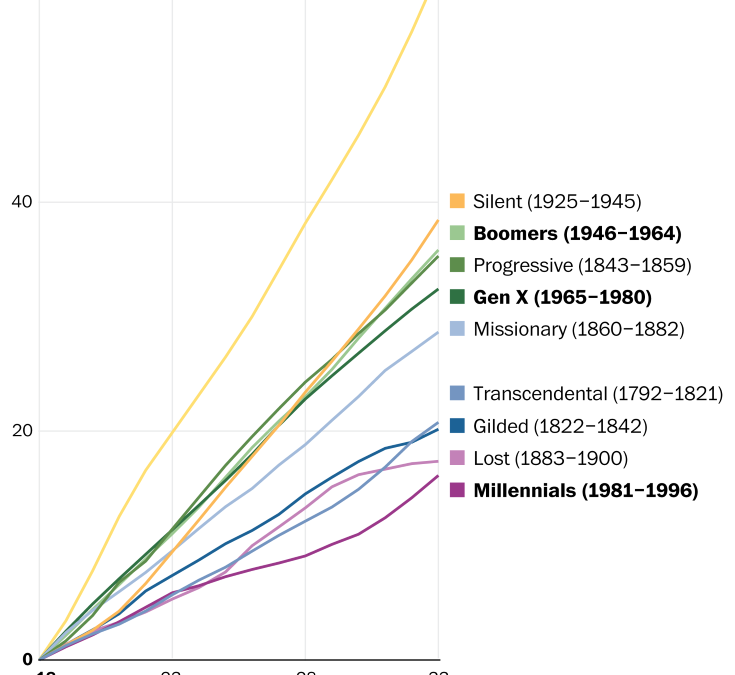New England cod fishery collapses as rapidly warming water and overfishing take toll – ‘The Gulf of Maine cod stock is in the worst shape we have seen in the 40 years that we have been monitoring it’
By Chris Mooney
29 October 2015 (Washington Post) – A new scientific study says that rapidly warming waters off the New England coast have had a severe consequence — the collapse of a cod fishery that saw too many catches even as overall cod numbers declined due to warmer seas. It’s just the latest in a series of findings and occurrences — ranging from gigantic snows in Boston last winter, which scientists partly linked with warm seas, to a sudden and “extreme” sea level rise event in 2009-2010 — suggesting that this particular stretch of water is undergoing profound changes. “2004 to 2013, we ended up warming faster than really any other marine ecosystem has ever experienced over a 10 year period,” says Andrew Pershing of the Gulf of Maine Research Institute, lead author of the new study just out in the journal Science. Pershing conducted the work with researchers from his institution and several others in the U.S. including NOAA’s Earth System Research Laboratory in Boulder, Colo., and Stony Brook University in New York. The paper reports that during the decade-long period in question, the Gulf of Maine, the ocean region extending from Cape Cod northeast to the southern tip of Nova Scotia, warmed up by a stunning 0.23 degrees Celsius per year (0.41 degrees Fahrenheit). That’s faster warming than occurred in 99.9 percent of the rest of the world ocean, the scientists say. During the same time period, this fishery’s managers did reduce cod quotas, but not enough — presumably because of a lack of realization about the rapidly warming waters and their stark effects on fish. As a consequence, the overall cod stock now stands at just 4 percent of its optimum size. Last November, the National Oceanic and Atmospheric Administration announced sharp restrictions on cod fishing in the area, with harsh consequences for fishing dependent communities like Gloucester, Mass. “The Gulf of Maine cod stock, a historic icon of the New England fishery, is in the worst shape we have seen in the 40 years that we have been monitoring it,” said John Bullard, NOAA Fisheries regional administrator for the greater Atlantic region, at the time. [more]
Climate change is doing some very strange things to the waters off New England
ABSTRACT: Several studies have documented fish populations changing in response to long-term warming. Over the last decade, sea surface temperatures in the Gulf of Maine increased faster than 99% of the global ocean. The warming, which was related to a northward shift in the Gulf Stream and to changes in the Atlantic Multidecadal and Pacific Decadal Oscillations, led to reduced recruitment and increased mortality in the region’s Atlantic cod (Gadus morhua) stock. Failure to recognize the impact of warming on cod contributed to overfishing. Recovery of this fishery depends on sound management, but the size of the stock depends on future temperature conditions. The experience in the Gulf of Maine highlights the need to incorporate environmental factors into resource management.
Slow adaptation in the face of rapid warming leads to collapse of the Gulf of Maine cod fishery

